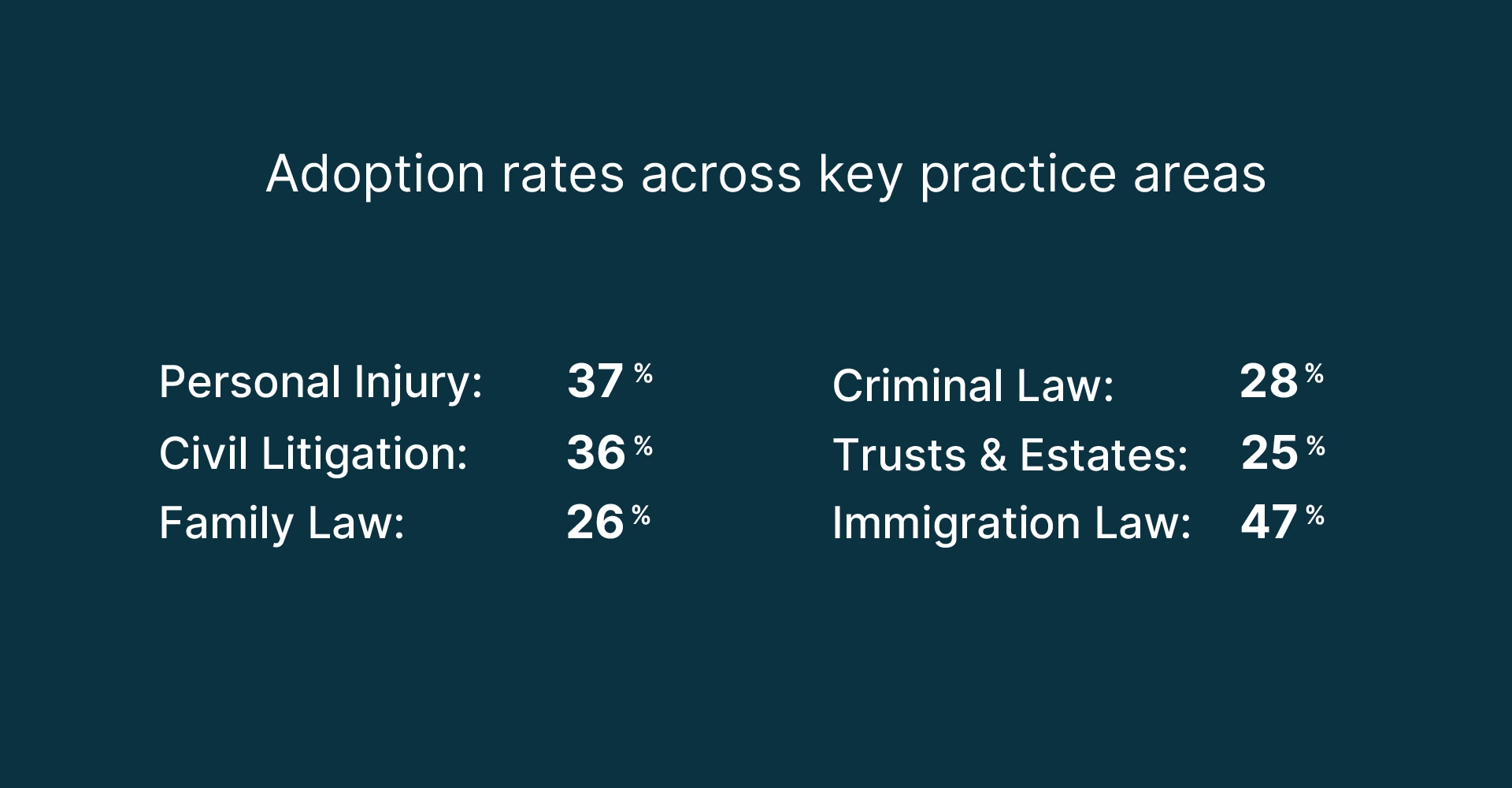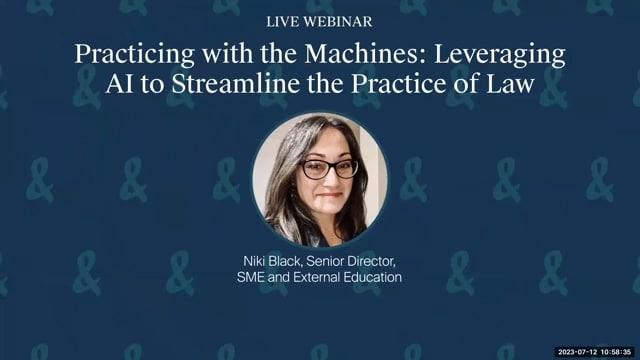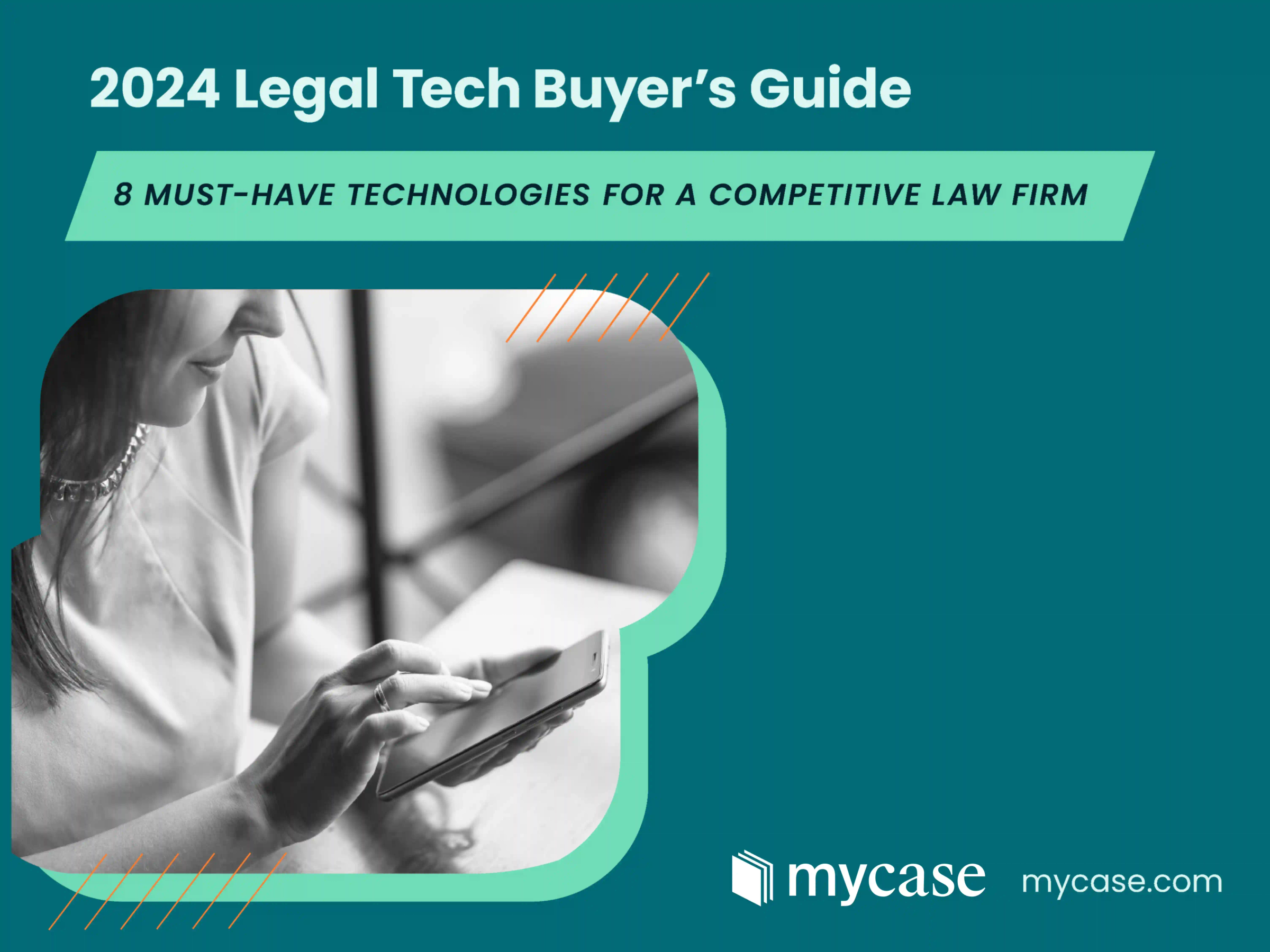Key takeaways
Individual lawyers are adopting AI faster than law firms, and adoption rates vary significantly by legal practice area.
Trust and ethical considerations are major roadblocks to wider AI adoption among law firms.
Firms are more likely to adopt AI when integrating it into software they already trust and use.
The primary purpose of incorporating AI in law is to streamline tasks and operations that traditionally require extensive human intervention, like document review or translation, transcript summarizations, legal research, contract analysis, client and case management, and billable hour tracking.
Even with concerns about privacy and seamless integration slowing overall adoption, 31% of lawyers and 21% of firms are using generative AI now, according to our 2025 Legal Industry Report. Additionally, 82% of these users have found that using AI increases their overall efficiency, allowing them to dedicate more time to complex tasks, strategic planning, and client nurturing.
This post provides a data-driven overview of AI applications in law, benefits, and critical considerations for legal professionals aiming to maintain a competitive edge in an increasingly digital-first industry.
For more insights across everything from AI ethics to legal research to firm productivity, explore our AI for Law Firms Resource Center for the full library of expert articles.
Emerging Trends in AI and Legal Tech
As AI usage grows in the legal profession, trends are taking shape. Our research uncovers common use cases for AI, tangible benefits, and patterns surrounding adoption and implementation. Below, we’ll go over these legal AI usage trends identified in the 2025 Legal Industry Report.
Slow Law Firm Adoption, Growing Individual Use
Across the board, individuals have been much more receptive to AI than firms. In 2025, 85% of lawyers use generative AI daily or weekly to enhance their work and streamline workflows.
Firms that intend to utilize legal AI software have still been relatively slow to adopt since they have to first wade through budgeting decisions, integration decisions, configuration confusion, and more. Of the firms that haven’t begun using AI, 37% plan to adopt it in the future to avoid falling behind the competition.
Prediction:
Adoption Varies By Practice Area
While the legal industry as a whole is cautiously exploring AI, adoption rates vary widely by practice area. Some fields are quickly embracing AI in law to boost efficiency, while others are still weighing the risks and rewards.
According to the 2025 Legal Industry Report: Personal Injury Insights, 37% of personal injury professionals personally use generative AI for work, and 19% of firms have adopted legal-specific AI tools. This places personal injury among the most proactive segments in legal tech adoption, with practitioners showing a stronger willingness than average to experiment with AI and emerging tools.
Here’s how adoption rates compare across key practice areas according to data from the 2025 Legal Industry Report and the 2025 Personal Injury Insights Report:
Personal Injury: 37% of professionals personally use AI for work
61% expect productivity gains from AI adoption
36% anticipate reduced administrative work
19% expect AI to replace some outsourced tasks
Civil Litigation: 36% individual use
Family Law: 26% individual use
Criminal Law: 28% individual use
Trusts & Estates: 25% individual use
Immigration Law: 47% individual use

While trust, ethics, and technical maturity remain common concerns across the board, firms also cite a need for better education and clearer use cases before fully committing to AI solutions. For practice areas like personal injury, where speed and documentation are critical, the value of automation is becoming increasingly apparent.
AI Uses Based on Practice Area
Across practice areas, firms are finding unique ways to leverage AI in law. While some focus on research and drafting, others are beginning to explore how automation can simplify administrative work and enhance client service.
Here’s how AI usage and expectations vary, based on data from the 2025 Legal Industry Report and the 2025 Personal Injury Insights Report:
Personal Injury
37% of professionals personally use AI at work, and 19% of firms have adopted AI firmwide.
61% expect AI to boost productivity, 36% anticipate reduced administrative work, and 19% believe AI will replace some outsourced functions.
Many firms already use AI to draft correspondence, summarize medical records, and analyze firm data for better business decisions.
Family Law
26% of professionals personally use AI, and 20% of firms report adoption.
Common uses include drafting and summarizing documents, reflecting how family law practitioners are integrating AI to save time on repetitive tasks.
Criminal Law
28% of professionals use AI personally, while 18% of firms have adopted AI firmwide.
Many rely on AI for legal research, brainstorming, and document summarization, helping attorneys process large volumes of case material more efficiently.
Trusts & Estates
25% of professionals use AI, and 18% of firms have adopted it.
AI is most often applied to drafting, summarizing, and extracting data from documents, supporting faster, more accurate client deliverables.
These insights underscore the growing importance of AI across all practice types. For personal injury firms in particular—where case documentation, deadlines, and client communication are key—AI is emerging as a powerful tool for boosting efficiency and improving outcomes.
Law Firm Adoption Driven By Integrations With Existing Tools
Firms are much more likely to trust AI technologies if the artificial intelligence tools are incorporated into trusted software they already use in their practice.
In fact, 43% of respondents adopted legal-specific AI tools because those tools were released into legal software with which firm attorneys had an existing relationship.
Many firms also appreciate the convenience of integrations, which allow them to streamline their work and easily collect analytics that empower them to make sound decisions in the future.
Prediction:
Many Use AI Daily and Experience Improved Efficiency
When attorneys and firms use AI daily or weekly, they experience significant benefits, most notably, improved efficiency. In 2025, attorneys primarily use AI tools for:
Drafting correspondence (54%)
Brainstorming (47%)
General research (46%)
Drafting documents (40%)
Summarizing legal documents (39%)
Legal research (38%)
Editing documents (35%)
Drafting document templates (32%)
With AI taking care of these once time-intensive tasks, it's unsurprising that 65% of individuals who have used AI in the legal industry save between one and five hours weekly, 12% save between six and 10 hours, and 7% save 11 or more hours.
Prediction: Those who adopt AI tools tend to fully integrate them into their routines, using them to streamline and enhance key aspects of their professional workflows.
AI Expected to Improve Productivity, Save Money, and Replace Administrative Functions
Attorneys and firms hope AI can streamline operations. The 2025 Legal Industry Report shows that 53% of respondents whose firms have already adopted AI anticipated increased productivity, 42% expected cost savings and efficiency, and 33% thought the technology would replace certain administrative functions.
However, there were differences across practice areas.
Elder law firms had the highest cost savings expectations and also hoped to eliminate some administrative functions, facilitate early retirement, and replace some lawyers.
Contract law firms were most interested in replacing legal-specific functions like contract drafting and review, automating previously outsourced work, and replacing administrative employees.
Personal injury firms showed the most interest in replacing some administrative functions, previously outsourced work, and certain legal-specific tasks—but less so than firms specializing in other practice areas. According to the 2025 Legal Industry Report: Personal Injury Insights, 66% of personal injury firms said they plan to use AI to streamline document review and case summaries, two time-consuming tasks often handled by support staff. Additionally, 61% indicated they are actively exploring AI to replace vendor services like medical record ordering and transcription, helping reduce operational costs and increase case velocity.
Most Law Firms Unsure When They’ll Implement AI
While legal artificial intelligence has tremendous potential, 60% of law firms are unsure when they'll implement it. Also, 42% of slow adopters cite mistrust in AI and ethical concerns, 41% want to wait for AI to become more reliable, and 36% worry about privilege misuse. To get past these concerns, many firms need additional education and assurances that AI can meet their performance standards.
Prediction:
Types of AI in the Legal Industry
In the legal industry, you might use generative AI to produce contracts, briefs, and arguments. You may also lean on predictive AI to analyze data and predict potential risks and outcomes.
These AI use cases in law firms rely on several technologies to understand and interpret commands, learn and improve outputs, and automate tasks. Here’s how they work together to serve as a well-rounded legal aid:
Machine learning (ML): ML technology enables systems to autonomously learn and improve from experiences without explicit programming. In the legal realm, ML is particularly valuable for analyzing vast amounts of data to identify patterns, which can enhance decision-making and operational efficiency over time.
Natural language processing (NLP): NLP allows machines to understand and interpret human language, making it indispensable in legal settings. It powers functions such as analyzing large volumes of legal documents or facilitating more intuitive interactions between lawyers and their digital tools.
Predictive analytics: This technology uses historical data to forecast future events, which can be pivotal information for legal professionals. Predictive analytics assists lawyers in developing case strategies and assessing risks by predicting potential outcomes of cases, thus informing better tactical decisions.
Robotics process automation (RPA): RPA employs software robots or “bots” to automate repetitive and routine tasks. By taking over such tasks, RPA frees legal professionals to concentrate on the more complex and high-value aspects of their work, significantly boosting productivity and reducing errors.
Generative AI: Generative AI takes existing data and uses the information it collects to create new content, such as music, images, texts, or code. Massive data sets are used to train generative AI to identify patterns and relationships within the data and use that information to produce something new.
Key Applications of AI in Legal Work
It is important to ensure the responsible evolution of legal AI so that it can supplement and enhance attorney work without compromising client privacy or a client's right to effective representation.
Here are some of the key applications of AI in legal work, which meet ethical standards and can significantly improve efficiency:
Contract analysis and management: AI dramatically speeds up contract review by automatically flagging potential issues and ensuring compliance with relevant laws and regulations. This helps mitigate risks and enhance the efficiency of legal operations.
Legal research: AI streamlines legal research processes, enabling lawyers to obtain comprehensive insights faster than traditional methods.
Case preparation: AI is useful when it comes to case prep. AI streamlines the document review and e-discovery processes. It also sorts and analyzes data, making case prep faster and more streamlined.You can also use AI in legal research to help find cases that could serve as precedents for your arguments.
E-discovery and document review: During the discovery phase of litigation, AI can efficiently sift through vast amounts of data to identify relevant documents. AI for legal documents can also translate foreign information in real time and at little to no cost. These capabilities not only speed up the process but also improve effectiveness.
Predictive case outcome analytics: AI tools offer data-driven predictions on case outcomes, providing lawyers with valuable insights that help with strategic planning and client advising.
Writing and client communications: AI-powered tools can edit, summarize, and refine your content quickly and efficiently. Advanced text editing and translation capabilities improve the tone and accuracy of client communications.
Translation: Different languages can be translated in real time, enabling law firms to operate globally—saving time and money on the translation process.
Legal chatbots and virtual assistants: These AI-powered tools improve client service by responding immediately to inquiries and supplying information 24/7. These tools can handle routine queries—freeing resources and enabling legal professionals to focus on more complex issues.
Data analysis: Real-time data analysis is one of the most important AI applications in law because AI can analyze vast amounts of data. This can provide insight into settlement data, how much a case is worth, and when it will settle.
Knowledge management: AI technology can capture information from its integration with other legal tools. It can organize and share this data so attorneys can leverage it to learn from the firm's collective legal knowledge, assist with document creation, and improve efficiency through faster access to a broader set of information.
Workflow management: AI will open the door to more effective workplace management by automating many tasks. For example, you can use triggers to create tasks, events, or documents, and even make completing another task in your workplace trigger a new task to complete. Reusable templates also allow you to create repeat tasks quickly, while you can set event deadlines to stay on track.
Litigation: AI in litigation will make court appearances easier. Artificial intelligence tools can help you gather data for case preparation or to effectively negotiate a settlement offer.
AI-powered case assistants: AI helps law firms manage cases more efficiently by organizing information, supporting faster access to case details, and reducing manual work across everyday workflows. For example, AI assistants can help attorneys quickly summarize case files and surface key information when they need it.

Benefits of AI for Law Firms
The integration of AI is revolutionizing legal work, by significantly boosting productivity, efficiency, and the quality of services provided. Below are some of the key benefits already manifesting.
Increase Productivity and Quality of Work
Whether using generative AI in law or other AI applications in law, it can make attorneys and firms more efficient.
By taking mundane tasks off the plate of skilled attorneys, AI frees lawyers to spend more time producing high-quality work for clients. Here are a few ways this could reshape the practice of law.
AI task scheduler: This tool streamlines task allocation and prioritization, ensuring that all deadlines are met efficiently without the need for manual oversight.
AI task assistant: This tool offers personalized recommendations for task management based on urgency, deadlines, and lawyers’ individual work habits, optimizing workflow and productivity.
AI-powered task management: When fully integrated with legal practice management software, this tool facilitates seamless management of case-related tasks, reminders, and follow-ups.
Reduce Errors and Administrative Burden
AI is drastically impacting how documents are handled within law firms, improving accessibility and efficiency.
The 2025 Legal Trends Report suggested that billing software errors could be reduced with AI integration, meeting times could be optimized and conflicts avoided.Additionally, human error in time-consuming tasks such as invoice preparation or correspondence drafting could be significantly reduced.
Identify Business Trends and Insights
AI can help firms better understand their industry. According to Josh Carter, a Senior AI Project Manager at AffiniPay, AI can analyze firm data to:
Identify trends in the business.
Understand client preference.
Keep track of metrics that drive profitability.
Significantly reduce time spent on non-billable tasks.
Key Challenges and Ethical Considerations
AI brings unique challenges and considerations to the legal profession. For example, flawed AI usage in law firms could contribute to inaccurate or biased outcomes, sensitive data exposure, job insecurity, and budget concerns.
Since attorneys are held to high moral and professional standards, using artificial intelligence ethically is particularly important. Here are some of the most pressing concerns to be aware of before implementing AI at your firm.
Accuracy of output: Ensuring that AI systems deliver accurate and reliable results is critical, as errors can have significant legal implications.
Data privacy and security: Law firms handle sensitive information—necessitating robust security measures to protect client data from breaches.
Privilege issues: Attorneys must fulfill confidentiality requirements. Providing client information to AI programs could potentially violate attorney-client privilege. If AI information falls into the wrong hands, this could also result in privileged information becoming public and clients being harmed.
Bias in AI algorithms: AI systems can perpetuate existing biases if not properly designed and monitored, potentially leading to unfair or discriminatory outcomes.
Job displacement concerns: AI’s ability to automate tasks traditionally performed by legal staff may shift job roles within the industry, requiring a reevaluation of skills and employment structures.
Regulatory compliance: The legal frameworks governing the use of AI are still evolving. Law firms must stay informed and compliant with new laws and standards to avoid legal pitfalls.
Cost concerns: Firms will find it helpful to scrutinize their ROI from AI to ensure they get sufficient value from the tools they integrate into their systems.
Lack of knowledge: Because AI is still a developing technology, the full scope of its capabilities is not always clear. A lack of knowledge about different AI tools and their features and functionality could hold firms back from adopting the technology.
Time required to vet options: Many companies are racing to develop new AI technologies, so it will take time for firms to evaluate options and find the right artificial intelligence tools at a fair price that enhance their practice.
By strategically addressing these challenges and leveraging AI’s capabilities, law firms can significantly enhance their operational efficiency and service delivery—ensuring they remain at the cutting edge of the legal industry’s transformation.

Which Legal Professionals Should Consider Utilizing AI?
Reviewing AI use cases in law and understanding different technologies can help you determine which legal professionals would benefit from AI.
The reality is that AI offers various benefits to individuals filling different roles within law firms. Here’s how various types of legal professionals can leverage AI to enhance their work and improve overall firm efficiency.
Lawyers
Lawyers benefit in many ways from AI. They can use tools like ChatGPT to analyze legal precedents and synthesize insights for stronger case strategies.
AI-driven document management systems also streamline the document review process by extracting critical insights and generating actionable timelines—improving courtroom preparedness and client satisfaction.
Legal/Administrative Assistants
With AI in the legal field, legal and administrative assistants can also save time in their workflow. Tasks such as scheduling, client communications, and document filing are automated—allowing support staff to focus on more strategic activities.
AI also assists in drafting documents that adhere to required standards, ensuring compliance and precision.
Operations Managers
Operations managers leverage AI in the legal industry for resource optimization and process automation.
AI-driven analytics predict workflow volumes and optimize operations—enhancing efficiency and reducing costs. This integration of AI in law firms supports better resource allocation and streamlined client services.
Financial Managers
Financial managers utilize generative AI for lawyers to automate billing and invoicing—ensuring accuracy and consistency. AI also plays a crucial role in financial planning—analyzing data to forecast trends and financial scenarios, and aiding in strategic decision-making.
Human Resources
Human resource professionals benefit from AI in the legal profession through an enhanced recruitment process.
AI streamlines candidate selection, automates interview scheduling, and facilitates efficient onboarding. Performance management is also optimized through AI insights, which assess productivity and highlight areas for improvement.
How to Choose the Right Legal AI Solution
There are many legal AI companies to choose from when you are ready to incorporate AI into your firm's practice. To choose the right solution for your business, consider these factors:
Assess your needs: Review your current workflows to identify bottlenecks that prevent you from racking up billable hours, error-prone areas, or any inefficient processes. In many cases, these are the perfect jobs to automate.
Research AI tools and providers: Once you know your weaknesses, explore legal AI solutions that offer proven solutions. As you narrow down your search, consider the scope of their capabilities, scalability, and user-friendliness to ensure they align with your firm’s current and future needs.
Consider compliance requirements: Legal firms are held to industry standards that prioritize accuracy and confidentiality. Before incorporating a new AI tool into your workflow, confirm that it meets these standards by reviewing the vendor’s security protocols, privacy policy, and data handling practices.
Research provider reputation: Read reviews to ensure the AI tool you’re considering has a proven track record of use in the legal field and responsive customer support. Positive reviews in these areas mean you’ll be less likely to encounter unexpected downtime or critical errors—and you can get help quickly if an issue does arise.
Compare pricing and ROI: Ideally, implementing an AI tool will save you money in the long run by speeding up administrative tasks and legal research. Run the numbers to make sure the price of configuration, training, and the tool itself don’t outweigh the cost savings.
Complete a free trial or demo: Finally, seek free trials or demonstrations to evaluate the effectiveness of an AI solution for your firm. Just because a tool looks like a good fit, doesn’t mean it will actually integrate into your workflows and deliver on promises in the way you hope.

AI in Law Is Here To Stay
The reality is that AI in law isn’t going to be a trend that fades away. Many individual attorneys and some firms have found that it increases efficiency. Additionally, there is ample potential for legal artificial intelligence to automate many repetitive and time-consuming tasks to streamline operations and free up attorneys for more complex work.
MyCase IQ is an AI-powered solution that can help your law firm more efficiently automate tasks and collect powerful insights in seconds. Current and upcoming features include:
AI-powered case assistant that summarizes case files and quickly surfaces key facts
Automated AI draft generation for messages and event descriptions
Intelligent text editing for grammar, spelling, punctuation, and tone of voice
Language translation for messages, task descriptions, and other text
Instant legal document summaries
(Coming soon) Comprehensive law firm analytics
(Coming soon) AI-powered insights into the firm’s data
(Coming soon) Seamless workflow automation
Schedule a demo today to learn how MyCase's legal AI software can streamline your practice management, increase efficiency, and enhance your client services.
To deepen your understanding of the technology behind these changes, explore our explanation of the differences between AI and generative AI in our article AI vs Generative AI: What’s the Difference?.
Frequently Asked Questions About AI in Legal Practices
About the author
Hannah DeFreitas (née Bruno) is a Senior Content Strategist and Blog Specialist for 8am, a leading professional business solution, and a senior content writer for 8am. Her work spans long-form articles, thought leadership, product storytelling, and conversion copy that distills complex legal and fintech topics into clear, human language. With nearly a decade of experience, she specializes in transforming research and data into narratives that enable professionals to work smarter and serve their clients more effectively.

